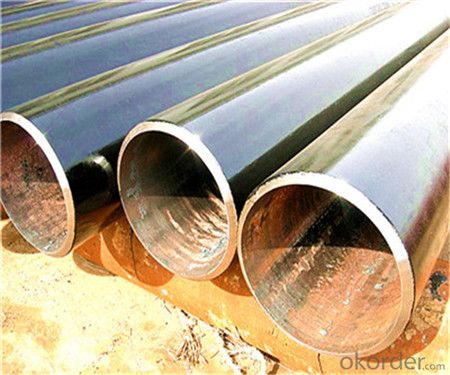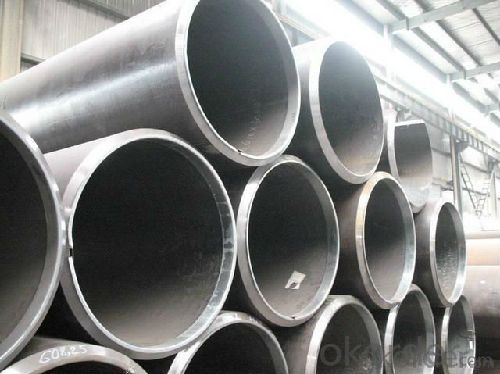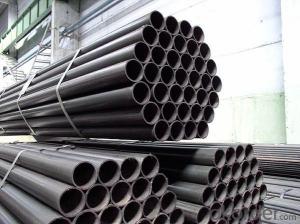Seamless Steel Pipe SCH40/80/STD Widely Used Multi Models
- Loading Port:
- Tianjin
- Payment Terms:
- TT or LC
- Min Order Qty:
- 100 m.t.
- Supply Capability:
- 1000 m.t./month
OKorder Service Pledge
OKorder Financial Service
You Might Also Like
Product Details:
1. Commodity Name: Carbon Seamless steel pipe
2. Standard: API,GB,ASTM,ASME,DIN
3. Quality grade: 10#, 20#, A106B, A53B, API 5L B, Q235, Q345, ST37-2, ST 45, ST52.etc.
4. Dimension:
OD: 1/2"-24"
WT: 2.5-80mm, SCH10~SCH40~XXL
Length: 5.8m,6m,8m,9m,12m
5. Technique: Hot Rolled/Cold Rolled/ Cold Drawn
6. Application:
Carbon seamless steel pipes are widely used in gas, water and oil, transpotation;constructions;Bridge,highway,windows of model steel door; building materials;fences;heating facilities Fluid Pipe;conduit pipe,scaffolding pipe.etc.
7. Payment Terms: L/C D/A D/P T/T
8. Packing and shipment
Packaged in bundles, and it can also be packagesd as beveled ends, typed marking, black painting, plastic caps protection,woven bags packing.
Packaging & Delivery
Packaging Details: | seaworthy package,bundles wrapped with strong steel strip |
Delivery Detail: | 15-30days after received 30%TT |
Seamless Steel Pipes Image


FAQ of Seamless Tube
①How is the quality of your products?
Our products are manufactured strictly according to national and internaional standard. If products’ quality don’t accord to discription as we give or the promise before you place order, we promise 100% refund.
②How about price?
We are factory and be able to give you lowest price below market one, and we have a policy that “ for saving time and absolutely honest business attitude, we quote as lowest as possible for any customer, and discount can be given according to quantity”.
③Why should you chose us?
Chose happens because of quality, then price, We can give you both.Additionally, we can also offer professional products inquiry, products knowledge train(for agents), smooth goods delivery, exellent customer solution proposals.Our service formula: good quality+good price+good service=customer’s trust
SGS test is available, customer inspection before shipping is welcome, third party inspection is no problem.
If you have any question, pls feel free to contact us !
- Q:What is the role of steel pipes in the construction of bridges and tunnels?
- The construction of bridges and tunnels heavily relies on steel pipes, which are widely used for various purposes due to their strength, durability, and versatility. When it comes to bridge construction, steel pipes are commonly utilized to fabricate the structural framework of the bridge. They act as the primary load-bearing members, providing support and stability to the entire structure. Steel pipes are particularly favored in bridge construction because of their high tensile strength, enabling them to withstand heavy loads, including the weight of vehicles and the dynamic forces generated by traffic. Steel pipes are also essential in the construction of bridge piers and abutments, which serve as the foundation and support for the bridge structure. To create sturdy foundations that can withstand the forces exerted by the bridge's weight and external factors such as wind, water currents, and seismic activity, steel pipes are often driven deep into the ground. Similarly, in tunnel construction, steel pipes play a critical role. They are extensively used for tunnel lining, which involves the installation of structural elements along the tunnel walls and roof to ensure stability and prevent soil or rock collapse. Steel pipes are commonly used as reinforcement elements, ensuring the structural integrity of the tunnel and protecting it from external pressures. Furthermore, steel pipes are utilized for underground utility systems in both bridges and tunnels. They act as conduits for various utilities, including water supply, electrical cables, gas pipelines, and communication lines. Steel pipes are ideal for these applications because of their corrosion resistance, ability to withstand high pressures, and long lifespan. In conclusion, steel pipes are crucial in the construction of bridges and tunnels as they provide strength, stability, and durability to these structures. They play a vital role in ensuring the safety and functionality of these critical infrastructure projects, allowing for efficient transportation and the seamless provision of utilities.
- Q:Can steel pipes be used for piling?
- Yes, steel pipes can be used for piling. Steel pipes are often used as piles in construction projects due to their strength, durability, and ability to withstand heavy loads. They provide strong support for structures and are commonly used in foundation systems for buildings, bridges, and other infrastructure.
- Q:What are the different types of joints used with steel pipes?
- There are several types of joints commonly used with steel pipes, depending on the specific application and requirements. Some of the most common types include: 1. Butt Joint: This is the most basic type of joint, where two pipes are aligned and welded together at their ends. It provides a strong and continuous connection but may require additional reinforcement depending on the pipe's size and pressure rating. 2. Socket Weld Joint: In this type of joint, one pipe is inserted into the socket of another pipe and then welded together. It is commonly used in smaller diameter pipes and provides good strength and leak resistance. 3. Threaded Joint: This joint involves screwing together two pipes with threaded ends. It is commonly used in low-pressure applications and requires the use of pipe threads and sealants to ensure a tight and leak-free connection. 4. Flanged Joint: With a flanged joint, two pipes are connected by bolting together flanges at their ends. This type of joint is commonly used in high-pressure applications and allows for easy disconnection and maintenance. 5. Grooved Joint: This joint uses a grooved coupling that is placed around the ends of two pipes and secured with bolts. It is commonly used in fire protection systems and offers quick installation and easy maintenance. 6. Welded Joint: In a welded joint, two pipes are fused together using various welding techniques such as gas tungsten arc welding (GTAW) or gas metal arc welding (GMAW). This joint provides a strong and permanent connection but may require skilled labor and additional equipment. Each type of joint has its advantages and limitations, and the selection depends on factors such as pipe size, pressure rating, application, and installation requirements. It is essential to choose the appropriate joint to ensure the integrity and reliability of the steel pipe system.
- Q:What are the different types of steel pipe coatings for corrosive environments?
- There are several types of steel pipe coatings that are commonly used for corrosive environments. These include fusion bonded epoxy (FBE) coating, three-layer polyethylene (3LPE) coating, three-layer polypropylene (3LPP) coating, and coal tar enamel (CTE) coating. FBE coating provides excellent corrosion resistance and is commonly used for underground pipelines. 3LPE and 3LPP coatings combine a layer of epoxy, an adhesive layer, and a polyethylene or polypropylene outer layer, offering superior protection against corrosion and mechanical damage. CTE coating, although less common nowadays, is still used for certain applications due to its resistance to water and chemical corrosion.
- Q:Can steel pipes be used for gas distribution?
- Yes, steel pipes can be used for gas distribution due to their high durability and resistance to corrosion.
- Q:What are the different types of steel pipe coatings?
- There are several different types of steel pipe coatings, including epoxy coatings, polyethylene coatings, zinc coatings, and galvanized coatings. These coatings are applied to steel pipes to protect them from corrosion and extend their lifespan.
- Q:How are steel pipes used in wastewater treatment?
- Steel pipes are commonly used in wastewater treatment to transport and distribute the wastewater throughout the treatment facility. They are used for various purposes such as carrying raw sewage, transporting treated water, and distributing chemicals for the treatment process. Steel pipes are preferred due to their strength, durability, and resistance to corrosion, making them suitable for handling the harsh and corrosive nature of wastewater.
- Q:Can steel pipes be used for oil wells?
- Yes, steel pipes can be used for oil wells. Steel pipes are highly durable and resistant to corrosion, making them suitable for the harsh conditions and high-pressure environments encountered in oil drilling operations.
1. Manufacturer Overview |
|
|---|---|
| Location | |
| Year Established | |
| Annual Output Value | |
| Main Markets | |
| Company Certifications | |
2. Manufacturer Certificates |
|
|---|---|
| a) Certification Name | |
| Range | |
| Reference | |
| Validity Period | |
3. Manufacturer Capability |
|
|---|---|
| a)Trade Capacity | |
| Nearest Port | |
| Export Percentage | |
| No.of Employees in Trade Department | |
| Language Spoken: | |
| b)Factory Information | |
| Factory Size: | |
| No. of Production Lines | |
| Contract Manufacturing | |
| Product Price Range | |
Send your message to us
Seamless Steel Pipe SCH40/80/STD Widely Used Multi Models
- Loading Port:
- Tianjin
- Payment Terms:
- TT or LC
- Min Order Qty:
- 100 m.t.
- Supply Capability:
- 1000 m.t./month
OKorder Service Pledge
OKorder Financial Service
Similar products
New products
Hot products
Related keywords































